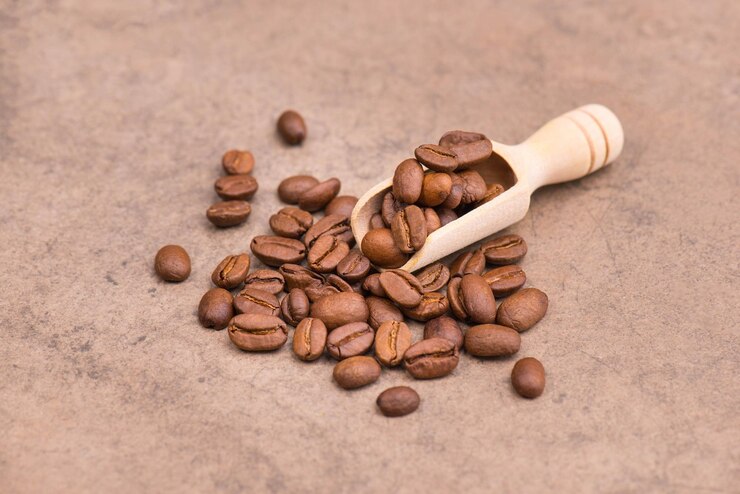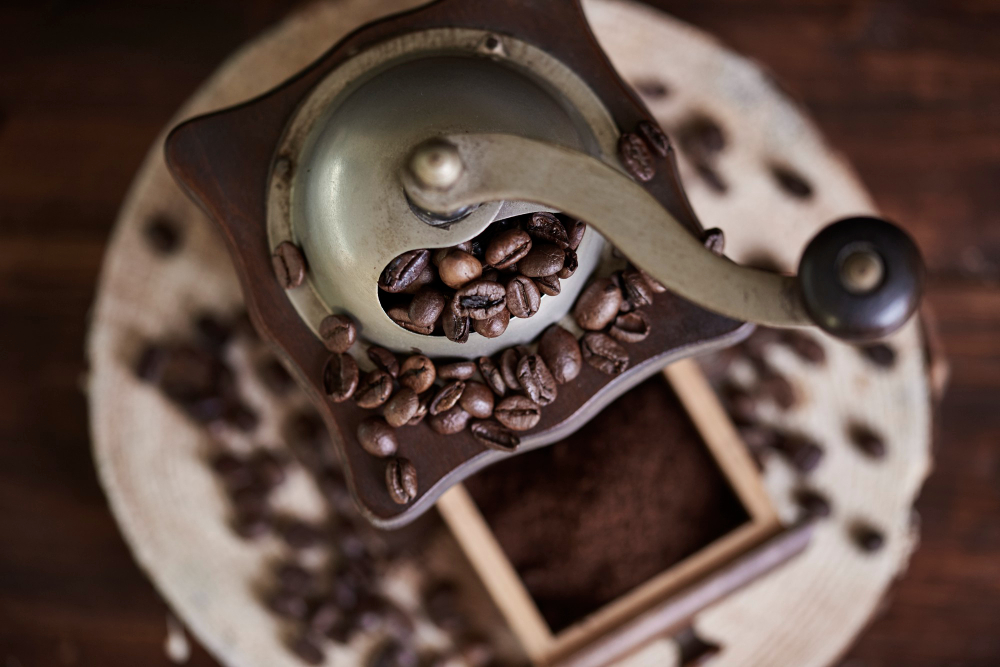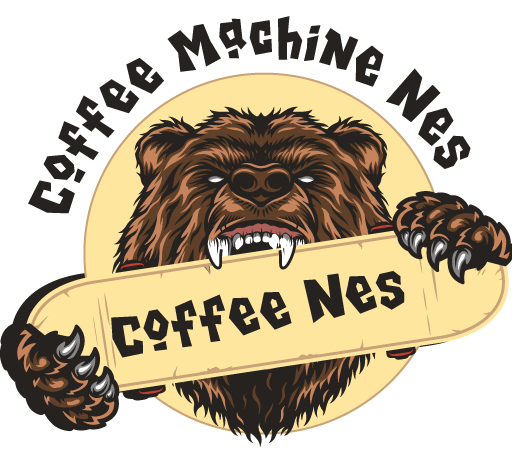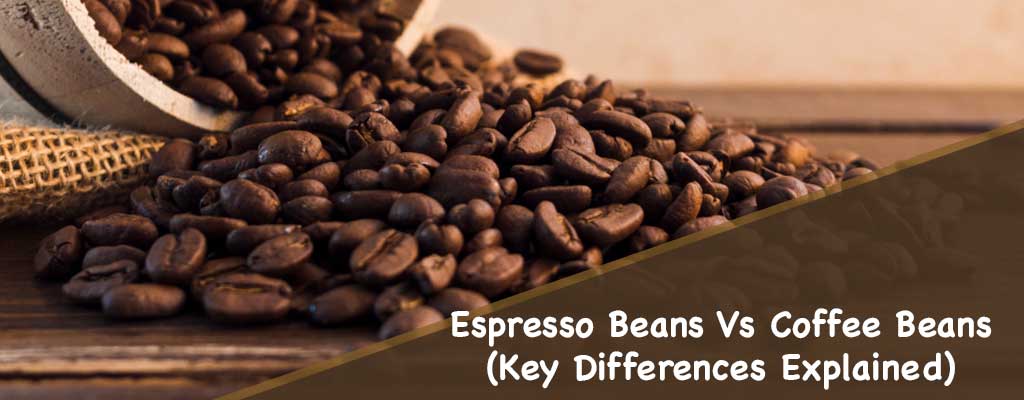Espresso beans vs coffee beans have a lot in common, however, it’s important to know how these two differ as the type of bean used has a major impact on the brewing process and flavor profile. Espresso beans tend to be a darker roast than coffee beans, often with a hint of smokiness.
Espresso usually comes from Robusta beans since they are denser and deliver the desired crema on top. Coffee beans, on the other hand, typically come from Arabica varietals which have a bright and acidic flavor profile.
The roasting process for these can vary greatly depending on flavor preference so it’s possible to find light-roasted or dark-roasted specialty coffees or blends of each.
In any case, understanding the differences between espresso and coffee beans is key before selecting your next delicious cup!

Espresso Beans Vs Coffee Beans: How They Differ
• Roast:
Espresso beans are usually roasted darker than coffee beans, with a smoky flavor profile. Coffee beans can be light or dark-roasted depending on the desired flavor.
• Bean Varietal:
Espresso is often made from Robusta beans while coffee is usually made from Arabica beans.
• Brewing Methods:
Different brewing techniques are used to extract espresso and coffee. Espresso is usually made using a specialized machine called an espresso machine, whereas coffee can be brewed in many different ways including via filter, French press or pour-over methods.
• Taste Profile:
The flavor of espresso is intense, bold and full-bodied. Coffee is often brighter, acidic and less intense in flavor.
• Caffeine Content:
Espresso usually has more caffeine than coffee beans due to the shorter brewing process used.
• Cost:
As espresso requires a machine for extraction, this cost needs to be factored into the overall price of coffee made from espresso beans. Coffee beans tend to be cheaper due to the variety of ways they can be brewed.
• Availability:
Espresso is usually only available in coffee shops or specialty stores, while coffee beans are widely available at grocery stores and online retailers. Now that you know the key differences between espresso beans vs coffee beans, you’ll be able to select the right type of bean when shopping and brewing at home.

Coffee Beans (Overview And Origins)
Coffee beans are the seed of the Coffee plant, which is native to tropical areas in Africa and Asia.
The two main species used for coffee production are Arabica and Robusta. Arabica is grown at higher altitudes, producing a sweet, bright and acidic flavor profile whereas Robusta is hardier and more bitter with a deep, earthy flavor.
Coffee beans can be processed in various ways including natural, washed or honey-processed and this affects the final cup of coffee you get. The roast level also plays a role in the flavor profile and is normally light, medium or dark for specialty coffees.
Light Roasted:
A light roast emphasizes the origin flavors of the beans and has a higher acidity.
Medium Roast:
A medium roast is usually smoother, sweeter and more balanced.
Dark Roast:
Dark roasts tend to have an intense flavor profile with smoky, chocolatey notes. Coffee beans are widely used for espresso, drip coffee, cold brew, and other beverages.
With the right beans and brewing techniques, you can create delicious cups of coffee to suit your taste preferences every time!
So now that you know a little more about coffee beans and how they are used, why not give it a go yourself? Grab some beans and start experimenting with different roasts and brewing methods today.
Related more:
Light Roast Vs Dark Roast Coffee
Does Coffee Contain Sulfites?
Espresso Beans (Overview & Origins)
Espresso beans are a type of coffee bean that is specifically used for espressos. The beans are usually roasted darker than regular coffee beans and have an intense, full-bodied flavor.
They also tend to have more caffeine than regular coffee, due to the shorter brewing process used. Espresso beans typically come from Robusta varietals and are often blended with Arabica beans for a unique flavor profile.
Espresso beans can be used to make other espresso-based beverages such as cappuccinos, lattes and macchiatos. With the right brewing technique, you can enjoy rich and flavorful shots of espresso every time.
Can Regular Coffee Beans Be Used For Espresso?
Yes, you can use regular coffee beans for espresso but they may not offer the same taste and texture as espresso beans. Espresso beans are roasted longer and often have higher levels of caffeine than regular coffee beans.
Also, because espresso is brewed with a high pressure extraction method, the beans need to be ground very finely in order for it to work properly. So if you’re looking to make a good espresso, it’s probably best to invest in some quality espresso beans.
We hope this article has helped you learn more about the differences between espresso beans vs coffee beans and how they are used in different types of beverages.
Common Coffee Bean Questions Answered
What is the main difference between espresso and coffee?
The main difference between espresso and coffee is the brewing process. Espresso is made by forcing hot water through a fine grind of very finely ground espresso beans to create a thick and concentrated shot of coffee, whereas regular coffee uses coarser grounds and can be brewed in various ways such as drip or French press.
Can any coffee beans be used for espresso?
No, not all coffee beans can be used for espresso. Espresso beans are usually a blend of Robusta and Arabica beans that have been roasted darker than regular coffee in order to bring out their full-bodied flavor profile.
Is there a difference between espresso beans?
Yes, there is a difference between espresso beans. Espresso beans can be blended from different origins and will have different flavor notes depending on where they are sourced from. Additionally, espresso beans are usually roasted darker than regular coffee to bring out their intense flavor profile.
What types of coffees can be made with espresso beans?
Espresso beans can be used to make a variety of coffee-based beverages such as cappuccinos, lattes, macchiatos, and even cold brew. With the right brewing technique you can create delicious cups of coffee with espresso beans.
Does eating espresso beans have the same effect as coffee?
No, eating espresso beans does not have the same effect as coffee. When eaten, espresso beans do not provide the caffeine kick that you would get with a cup of brewed coffee and can actually cause digestive distress if consumed in large quantities. It is best to stick to drinking your espresso instead.
How many espresso beans can you eat to equal a cup of coffee?
It is not recommended to eat espresso beans as a substitute for drinking coffee. Eating espresso beans does not provide the same amount of caffeine that you would get from a cup of brewed coffee, and eating too many can cause digestive distress. It is best to stick to drinking your espresso instead.
Why is espresso healthier than coffee?
Espresso is often seen as a healthier alternative to coffee because it has less caffeine and is usually made with higher quality beans. Additionally, espresso uses a pressure brewing process which extracts more antioxidants and other beneficial compounds from the coffee beans compared to regular drip or French press coffee. This can help reduce inflammation and improve overall health in some cases.
Does espresso have more antioxidants than coffee?Yes, espresso has been found to have higher levels of antioxidants than regular coffee because it is brewed with a high pressure extraction method which extracts more beneficial compounds from the beans.
This can help reduce inflammation and improve overall health in some cases. However, it is important to note that other factors such as the quality of the beans used for brewing can also impact the antioxidant content of a cup of espresso.
Conclusion
If you’re trying to choose between espresso beans and coffee beans, it’s important to know the key differences between them. Espresso beans are darker, have more oil, and a higher caffeine content than coffee beans.
They also cost more per pound. Espresso beans are best for making espresso or cappuccino, while coffee beans are better for brewing regular coffee.
Now that you know the key differences between espresso beans vs coffee beans, you can make a decision about which one is right for your needs.
I’m Jeff Olson, and I love coffee. In fact, I’m something of a professional about coffee. I own and operate coffeemachinenes.com, one of the web’s top resources for everything coffee-related. I’m also an avid home barista, and enjoy experimenting with different brewing methods and flavor profiles. When I’m not nerding out about all things coffee, you can find me playing guitar or spending time with my wife and kids.

